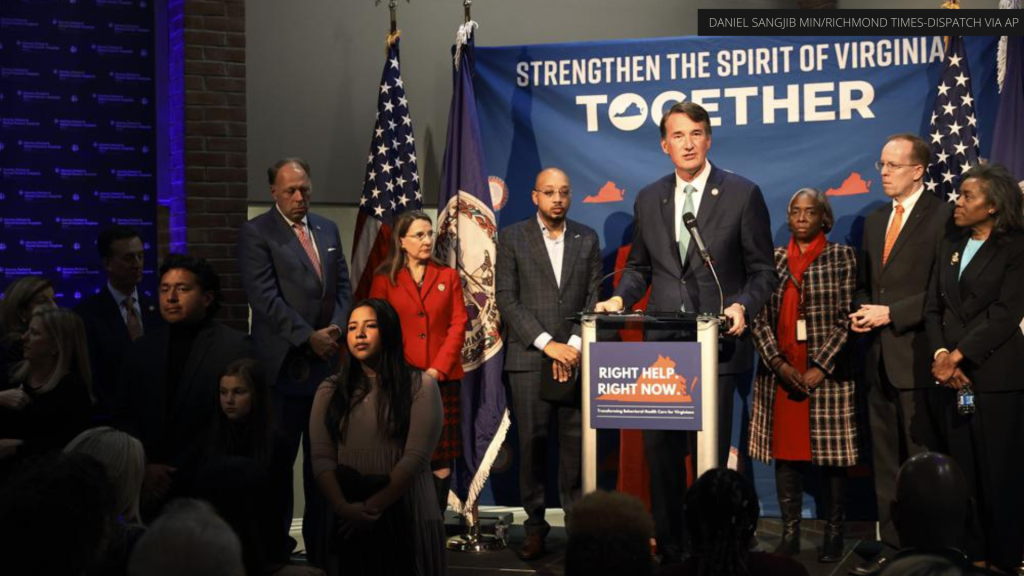RICHMOND, Va. (AP) — Virginia needs a major new investment in funding for behavioral health care services, Republican Gov. Glenn Youngkin said in a speech Wednesday, pledging to spend the rest of his time in office working to transform a system he said faces a “crisis” of people in need.
“Our jails, emergency rooms and hospitals are filled with people in mental health or substance use crisis. Law enforcement is overwhelmed. Our teachers are burned out. Our health care heroes are at their wit’s end. Parents and families feel lost and alone, and too many Virginians are afraid,” Youngkin said.
“It is critically important that we get this right,” he said, speaking at Parham Doctors’ Hospital in suburban Richmond.
The governor is set to unveil his full budget proposal to the politically divided General Assembly on Thursday. He said the budget would include over $230 million in new funding for mental health services. That proposed allocation, combined with funding previously earmarked in the last budgeting cycle, would bring total spending on behavioral health care to over $660 million in the next fiscal year, the governor’s office said.
Youngkin said the recent gun violence that has afflicted the state — including a campus shooting at the University of Virginia and a mass shooting at a Chesapeake Walmart — underscores the urgency of the issue. News reports have described the suspects in both shootings as having displayed erratic behavior.
Elizabeth Hilscher, who chairs the state board of Behavioral Health and Developmental Services and whose daughter was among the 32 killed in the 2007 massacre at Virginia Tech, said she was heartened to see a governor make mental health a top priority.
Hilscher, who was nominated to the board by former Democratic Gov. Terry McAuliffe, said Virginia has one of the worst mental health systems in America. She said she had seen incremental improvements in fits and starts but also backsliding amid turnover in gubernatorial administrations and staff.
Hilscher said she thought Youngkin’s plan could help save lives. But she added she would like to see action on “sensible gun laws” as well.
When asked recently about his willingness to consider gun control measures, Youngkin said he first wanted to see the results of the criminal investigations into the UVA and Chesapeake shootings.
In his remarks, which lasted nearly a half hour, Youngkin shared the stage with other elected and local officials including Lt. Gov. Winsome Earle-Sears.
Youngkin appeared moved to tears during remarks given by his wife, Suzanne. She told the story of how in 2012, a daughter of Earle-Sears who struggled with bipolar disorder “decided it was time to speed away from the demons that were traumatizing her” and died in a car collision that killed her and two of Earle-Sears’ grandchildren, Faith and Victoria.
Asked later about his personal convictions on the issue, Youngkin responded: “There’s not a person in the room who hasn’t been touched directly with a mental or behavioral health challenge. And our family is no different.”
He went on to say that he had been inspired by the tragedy Earle-Sears’ family and others have faced to work toward improvements.
State officials across the partisan divide have long acknowledged improvements are needed in Virginia’s system for delivering mental health and substance abuse services. Among the issues: the state’s mental health hospitals suffer from major staffing shortages, at one point suspending some admissions amid the coronavirus pandemic. Law enforcement officials say they are strained by their role in transporting patients under detention orders, and a recent watchdog report found problems with the state’s psychiatric bed registry as well as long wait times for services like therapy.
Youngkin outlined six areas of focus, including ensuring that same-day care is available for those in behavioral health crises.
He said his budget would call for spending $20 million to fund 30 additional mobile crisis units, which respond to calls to Virginia’s 9-8-8 hotline. He called for $58 million to increase the number of crisis receiving centers and crisis stabilization units for individuals in urgent need and $20 million for partnerships with hospitals to help them find alternatives to emergency departments for those in crisis.
He laid out plans to develop the behavioral health care workforce, including by boosting pay for environmental and food service workers at state hospitals.
Youngkin also pledged to work toward a three-year goal of eliminating the top priority waitlist for Medicaid waiver slots, which help individuals with developmental disabilities receive services.
It often takes anywhere from 18 to 30 years on the waitlist before receiving a slot, said John Littel, Youngkin’s secretary of health and human resources.
The governor’s proposed budget typically serves as a starting point for negotiations during the General Assembly. Wednesday’s proposals would require legislative approval to take effect.
Democratic Sen. Creigh Deeds, who chairs the state’s Behavioral Health Commission and has been a leading advocate on mental health issues, said in a statement that he appreciated the governor’s attention to the issue.
“This is a step in the right direction, but we need to do more,” Deeds said.

Copyright 2022 by the Associated Press. All Rights Reserved.
Tune in live for more on the stories that matter to you: WMAL.com | WMAL app | “Alexa, play W-M-A-L”
Follow WMAL on social media: Twitter, Facebook, Instagram, Youtube, Rumble, Gettr and Parler




















